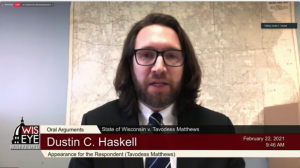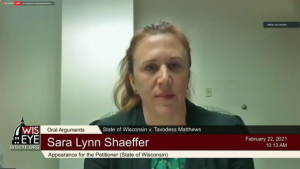Meaning of ‘the hearing’ in judicial-substitution statute debated before Supreme Court
By: Michaela Paukner, [email protected]//February 22, 2021//
Meaning of ‘the hearing’ in judicial-substitution statute debated before Supreme Court
By: Michaela Paukner, [email protected]//February 22, 2021//
The meaning of “the hearing” in a Wisconsin statute allowing for judicial substitutions was up for debate before the Wisconsin Supreme Court.
The court heard oral arguments in State v. Tavodess Matthews on Monday. Matthews is asking the justices to decide if an adjourned probable-cause hearing is a preliminary contested matter that should terminate his opportunity to request judicial substitution.
In 2018, the State filed a petition seeking an order committing Tavodess Matthews as a sexually violent person. A Milwaukee County court issued an ex parte order finding that the petition established probable cause that Matthews was sexually violent, scheduled a probable cause hearing and ordered Matthews’ detention.
At the probable cause hearing, Matthews’ counsel requested an adjournment and Matthews waived the time limits on the probable cause hearing. The State objected, but the court accepted the waiver and adjourned the hearing until Aug. 29.
On the morning of Aug. 29, Matthews filed a request for judicial substitution. Under Wis. Stat. § 801.58(1), any party may request judicial substitution within 60 days after service of a summons and complaint, and before “the hearing of any preliminary contested matters.”
The trial court denied the judicial substitution request as untimely and deemed the acceptance of Matthews’ waiver of the time limits for the probable cause hearing as a decision on a contested matter. The chief judge and a Court of Appeals affirmed the decision, concluding that the adjournment of the April hearing was a preliminary contested matter.
The case then went to the state Supreme Court, and the justices heard arguments about what “the hearing” means within the statute and how that interpretation affects the deadline for a substitution request.

Under that definition, Haskell argued that probable cause was never heard by the court or argued by any of the parties.
“Proceeding the hearing of any preliminary requested matters requires that the court actually hear something related to the substantive matters in the court, not simply scheduling a hearing,” Haskell said.
Sara L. Schaeffer, who appeared for the State, argued that the court proceeded exactly as the Legislature intended and rightfully ruled Matthews’ request as untimely. She said the statute should be interpreted with “the hearing” read as a noun. In that case, Matthews’ filing of the request was untimely because the hearing started.
“He had 15 days to file his substitution request,” Schaeffer said. “He didn’t do it before the hearing started. Therefore, under the plain language of that statute, it was untimely.”
Haskell said the State was blurring the lines between what happened at the hearing and what would have happened had there not been an adjournment.
“Ruling on the adjournment doesn’t affect the merits of the case in any way,” Haskell said. “…It’s only after that, once we’ve started discussing probable cause that we’ve gotten to the merits of the matter.”

But Schaeffer said the state Supreme Court’s decision in State ex rel. Sielen v. Circuit Court for Milwaukee County provides that the right to judicial substitution is extinguished if the circuit court could have ruled in a way that implicated the merits of the case.
“If the court would have denied the motion to adjourn, the motion to extend, that implicates the merits of the case going further because it implicates whether the probable cause hearing had to go forward,” Schaeffer said. “That implicates Mr. Matthews’ rights to have efficient counsel represent him at the probable cause hearing.”
The state Supreme Court will release its decision at a later date. A recording of the oral arguments is available via Wisconsin Eye. Follow @WLJReporter
Legal News
- Rep. Ryan Clancy holding Milwaukee fundraiser promoted by alleged ‘anti-Semitic group’
- Man representing self in murder case of 11-year-old
- Toxic Torts: 2 chemical spills plague Wisconsin airport
- Boeing to plead guilty to fraud for violating deal over 737 Max crashes
- Indiana police standoff with armed man ends when troopers take him into custody and find boy dead
- Alec Baldwin arrives in court in fatal shooting of cinematographer
- UW-Milwaukee chancellor to step down next year amid handling of Pro-Hamas protesters
- Wisconsin Republicans are improperly blocking conservation work, court says
- Man hurt when home in rural Wisconsin explodes has died, authorities say
- Wisconsin Supreme Court changes course, will allow expanded use of ballot drop boxes this fall
- Gov. Evers appoints Travis Maze as Jefferson County Sheriff
- Democrat Dora Drake wins open seat in Wisconsin state Senate
Case Digests
- Attorney Professional Misconduct
- CHIPS Petitions
- Insufficient Evidence-Sexual Assault of a Child
- Slip and Fall-Governmental Immunity
- Restricting Felons from Holding Public Office-Venue
- Deceptive and Unfair Pricing Practices
- Attempted Enticement of a Minor-Sentencing
- Deliberate Indifference
- Race Discrimination
- Unconstitutional Search-Motin to Suppress
- Sentencing Guidelines-“Analogue of Fentanyl”
- Copyright Infringement











